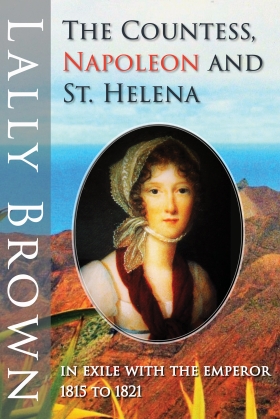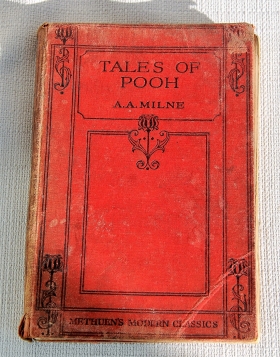I am delighted to welcome Lally Brown to my blog this week. A talented photographer, Lally now lives on the Isle of Wight, but she previously lived on Montserrat, which inspired her books, The Volcano, Montserrat and Me; High and Dry in the BVI; and The Countess, Napoleon and St Helena.
Lally has agreed to take part in the Take Two Characters series and has produced an interesting take on the subject, not just because her own books are based on true events, but also because she has interpreted the second part of the brief - choosing a favourite character from another author's writing - rather more widely than previous guests have done.
* * * *
|
When Susanna invited me to contribute a post for her “Take Two Characters” series I was hugely flattered (I’m a great admirer of Susanna’s novels!) and I knew without hesitation which two characters I would choose.
I’m delighted to be able to share them with you, although I am slightly apprehensive that you might think my choices unusual and my second possibly even a little frivolous, however here goes. |  |
Up first is a character from my own writing, the beautiful aristocratic French Countess Françoise-Elisabeth (Fanny) Bertrand.
I should explain that Fanny is not a fictional character but an historical figure and her unusual and unhappy story is entirely fact-based and the result of research into primary source manuscripts in the British Library and on the island of St. Helena.
|
 |
Most people know that after his defeat at the Battle of Waterloo in 1815 Napoleon Bonaparte was exiled to remote St Helena, what few realise is that he was accompanied by an entourage of twenty-four, and among them was my heroine Fanny Bertrand, her husband and their three children aged 4, 5 and 6.
Like Napoleon’s first wife Josephine, to whom she was related, Fanny was a Creole born in Martinique. Tall and elegant she was beautiful, spirited, excitable, and very passionate.
|
Fanny’s marriage was arranged on the orders of Napoleon and was not a love match. In fact Fanny was most unflattering about her future husband complaining to Napoleon ‘he looks like the Pope’s monkey!’
However against all odds the two did become very fond of each other, possibly because they were such opposite characters. Her husband was Napoleon’s Grand Marshal. He was much older, very quiet and quite simply rather boring, whereas Fanny loved fashionable clothes, parties and having fun. She was very popular and shone in high society. Her husband called her his ‘fiery Creole’.
When she heard her husband had agreed to accompany Napoleon into exile Fanny was distraught. The thought of living on a remote island in exile with her embittered ex-Emperor horrified her. She begged herhusband not to go, even attempting to throw herself overboard into the harbour. But loyalty and duty to his Emperor and a belief that the exile would be short-lived decided him.
Fanny was sea sick for much of the journey to St. Helena, and when she saw the rugged bleak outline of the island for the first time she was appalled and is quoted as saying to Napoleon “The devil sh*t this place as he flew from one continent to the other”.
It was not the short exile Napoleon had hoped, instead he was to die on the island and the little Bertrand family remained on St. Helena for over five years. It was a time of great stress and sadness for poor Fanny.
She hated the island and was deeply unhappy with no friends, no society, restrictions imposed upon her by both Napoleon and the British Governor, and although one son was born successfully she suffered several dangerous miscarriages. The final straw came when towards the end of his life Napoleon demanded that Fanny become his mistress. That was just too much for poor Fanny, she refused absolutely and again begged her husband to leave. Napoleon was humiliated and angry and never forgave the couple saying that ‘her husband should have prostituted his wife and that he ought to have made up her mind for her when she proved refractory.’ Napoleon took his revenge by spreading malicious untrue rumours about Fanny’s infidelity with British Officers and refusing to see her until he was on his death-bed.
Fanny, her husband and four children left St. Helena three weeks after Napoleon’s death. Pardoned by the French Government they returned to a quiet life at their château in France. Fanny died of cancer fifteen years later.
For two years I lived in the house they built for Fanny on St Helena. Her presence was with me daily. But no-one could tell me anything about her except that her ghost, dressed in black mourning clothes, was supposed to haunt the house. So I determined to research the story of this unhappy and forgotten ‘Fiery Creole’ on St Helena who was forced against her will into exile with ex-Emperor Napoleon. The more I discovered the more I admired this resilient, strong willed, unhappy woman who was controlled absolutely by the men in her life.
*
My second choice could so easily have been the lovely Russian Countess Anna Karenina or the dashing Fitzwilliam Darcy, that aloof romantic hero in Jane Austen’s ‘Pride and Prejudice’ (sigh!) but instead I have chosen a character who has been a favourite in my family for four generations, the adorable little bear Winnie-the-Pooh by A.A. Milne.
My mother, an accomplished actress, read ‘Tales of Pooh’ to me when I was an infant and I honestly believe this little bear had a profound influence on shaping the person I was to become. He certainly inspired me to write my first ‘poem’ when I was six and his pearls of wisdom are as pertinent today as they were when the book was first published in 1926.
“You are braver than you believe, stronger than you seem, and smarter than you think.”
“Love is taking a few steps backwards, maybe even more, to give way to the happiness of the person you love.”
“Sometimes, if you stand on the bottom rail of a bridge and lean over to watch the river slipping slowly away beneath you, you will suddenly know everything there is to be known.”
|
My mother’s 3rd Edition copy (1935) of ‘Tales of Pooh’ has been handed down and read to each new generation. Looking a bit battered now but still much loved.
By his own admission Pooh was not the sharpest tool in the box “For I am a bear of little brain and long words bother me” who was “short, fat and proud of that”. Maybe he was a little naïve but so kind-hearted, brave, surprisingly wise, very sociable, a steadfast friend and a talented poet. In my opinion an all-round happy-go-lucky great guy! |  |
Well it’s almost eleven o’clock so I’m off to get a little smackerel of something before I slip out for a game of Poohsticks before returning for lunch ..... Hurrah for Pooh!
Lally's Links: Her Twitter page
The Countess, Napoleon and St Helena
The Volcano, Montserrat and Me
|


Make A Comment
Comments (11)
Especially because it's Women's History Month, Fanny's story has even more poignancy to me.
And Winnie the Pooh is an old favourite with wisdom for life well beyond childhood days. I particularly appreciate your inclusion of Pooh because his name Winnie comes from 'Winnipeg' my Canadian hometown--and a statue in a local park commemorates that link between Canada and England and a Canadian soldier in the First World War.
Kindest regards, Lally
So pleased you enjoyed my choices... Pooh is such an entertaining character I just couldn’t resist having him, must admit though that little Piglet is one of my own favourites, and my son is so absolutely Eeyore it’s almost scary and my oldest grandson is quite definitely Tigger! 😂 p.s. I really enjoyed your post!
Winnie the Pooh is a great choice - one of my favourite childhood books, although I always saw myself as a Piglet rather than a Pooh. One of those quotes really chimed with me: “Love is taking a few steps backwards, maybe even more, to give way to the happiness of the person you love.” I should have used that one last week, in defence of my character Mary Black!